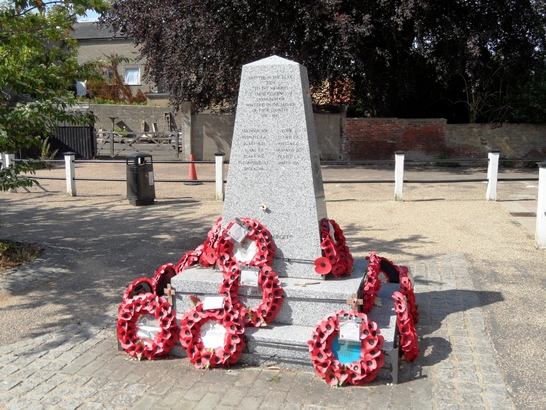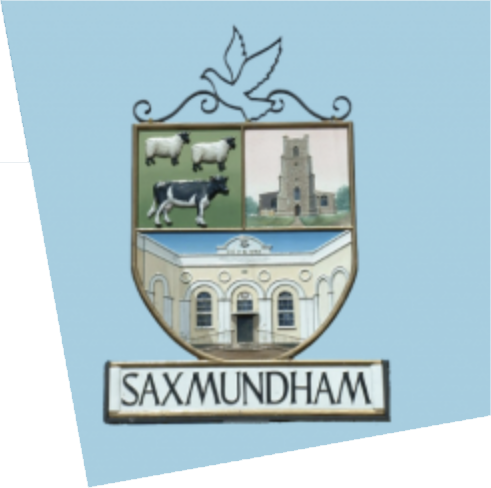
Saxmundham Memorial Trail
Fromus Square

Fromus Square, The War Memorial, Stop 4.
The Fromus Square Memorial – a brief history of the monument
In July 2005, the new Memorial inaugurated some sixty years after the end of the Second World War and nearly eighty-seven years since the end of hostilities of the First World War ensured that Saxmundham has a Memorial Monument for future generations to remember those that perished in the service of our country.
Until quite recently the central focus of memorialisation for those that perished in the two twentieth-century wars were the stone memorial tablets in St John the Baptist Church and the United Reformed Church (the former Congregational Chapel) plus the Memorial Field off Rendham Road. The desire for a monument is not new. In the early 1920s, a significant minority in Saxmundham wanted a tangible monumental memorial. This was reconsidered in 1944, in preparation for the end of the Second World War, for a monument for those that perished but no action was taken. The new millennium refocused ideas.
Nationally the Royal British Legion (RBL) discussed if all memorials should be under the control of a central government funded Heritage Committee, albeit the proposal failed. Also in 2000, compensation payments were agreed by the Japanese government for Far East POWs. Locally there were a number of men, both alive and those that lost their lives in the Far East who were eligible. Both factors, Denis Bloomfield suggested, may have inspired local RBL members to consider the benefit of a monumental memorial in Saxmundham.
The concept for a dedicated memorial in Saxmundham started in 2000 and by 2001 members of the Saxmundham and District RBL actively sought funding. It was agreed to set up a Charitable Trust with the Town Council to move the project forward and a project team comprising councillors and RBL members met for the first time in October 2001. In the interim, a notice board was erected at the entrance to the Memorial Field, ‘portraying it as a living Memorial of all those who gave their lives in the two world wars, also in successive wars since 1945’ but the monument project still had many hurdles to cross.
In March 2002, it was proposed that the monument be sited in the proximity of Waitrose (formerly Somerfield) and that the area be named Fromus Square. By August 2002, discussions were underway regarding the material for the monument. The Memorial Appeal attained Registered Charity status in December 2002, and by November 2003 it was hoped to unveil the memorial in June 2004. However, negotiations took time.
The land jointly belonged to Somerfield and owners, of The White Hart Inn, Pubmaster, and it was September 2004 before solicitors had finalised the legalities with the Town Council. Thereafter work began and by November 2004 the development of Fromus Square as the ‘focal point’ of Saxmundham was underway. Whilst the square was an asset for the town, the inauguration of the Fromus Square Memorial on 17 July 2005, resulted from the great effort of the Saxmundham and District RBL, their fund raisers and the dedication of Memorial Trust Committee Secretary, Roy Simpson.
The inauguration of the Memorial Monument started with a parade leaving Lambsale Meadow at 15.00 hours accompanied by the Standard Bearers and the Leiston RBL Band. In consideration of the importance of the ceremony, the White Hart Inn ensured that the back door was locked! The Chief of the Defence Staff, General Sir Michael Walker G.C.B., C.M.G., C.B.E. unveiled the memorial and wreaths were laid by the Council during the ceremony and afterwards by the RBL and Women’s Section. The Memorial Trust Committee; Secretary Roy Simpson, members Frank Clark, Denis Eaves, Don Edwards, Ron Howarth and David Scully had, some sixty years after the end of the Second World War and nearly eighty-seven years since the end of hostilities of the First World War ensured that Saxmundham has a Memorial Monument for future generations to remember those that perished in the service of our country.
Produced from extracts of the minutes, with thanks to the Saxmundham and District Branch, Royal British Legion.

